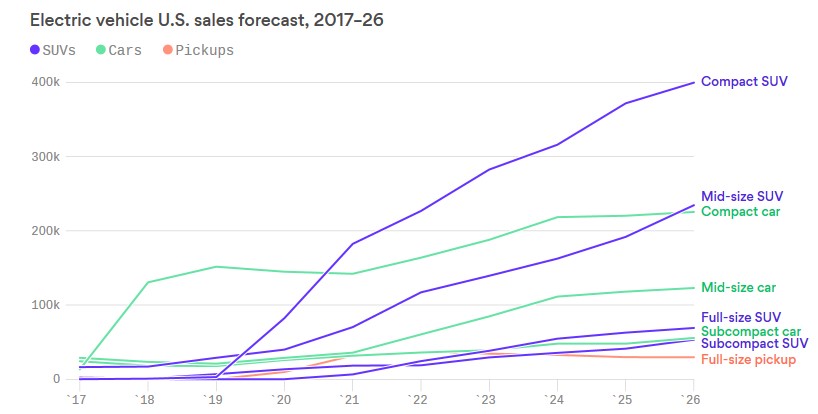The United States’ electric vehicle market is amped up and surging ahead full throttle. While EVs have truly revolutionized the global automotive sector since their inception about a decade and a half ago, for all their pomp and verve, EV sales currently make up just a tiny fraction of total car sales in the country.
However, this is set to change—and quite dramatically, too.
IHS Markit, a London-based global information purveyor, recently released predictions for the U.S. EV market that sounds like sweet music to EV buffs—but is equally alarming for pistonheads.
According to the firm, the U.S. market for fully electric vehicle sales is expected to balloon from just 200,000 units in 2018 to 1.28 million units in 2026, representing an impressive 540 percent growth or 30.4 percent CAGR. Fully EV vehicles, aka battery-electric vehicles (BEVs), account for about two-thirds of global EV sales with plug-in hybrid-electric vehicles making up the rest.
Much of that growth is expected to come at the expense of the ICE (Internal Combustion Engine) market — the firm says fully electric vehicle sales will account for 7.6 percent of all new vehicle sales seven years from now compared to just 1.16 percent last year.
The e-SUV takeover

Source: Axios
Leading EV player, Tesla, Inc. better get ready to start facing some serious competition as well. IHS has predicted that electric vehicle buyers will soon be spoilt for choice, with 43 companies offering at least one EV brand seven years down the line compared to just 14 last year. Related: The Looming Recession Will Be Worse Than 2008
Driving the inexorable rollout of fully electrified vehicles on American roads will be the Electric Sports Utility Vehicle (e-SUV), an underrepresented segment in the EV market. Whereas trucks and SUVs account for more than half of U.S. car sales as per BloombergNEF, SUVs comprise just 19 percent of current EV model offerings. IHS says that this situation is unlikely to persist for very long, with e-SUV sales expected to clock in at 757,000 units, or nearly 60 percent of total EV sales, by 2026.
Current e-SUV heavyweights include Tesla(U.S.), Toyota Motor Corporation (Japan), BMW Group (Germany), Volvo Car (Sweden), Jaguar Land Rover (UK), Porsche AG ( Germany), The Hyundai Motor Company (South Korea), Nissan Motor Co. Ltd.(Japan) and Honda Motor Company, Ltd. (Japan).
The EV tipping point
The U.S. EV industry marked an important milestone in 2017 after global sales crossed one million for the first time ever. In 2018, sales doubled to two million units.
Yet, the true tipping point for the industry is expected to come roughly three years from now.
According to the recent BEV industry report by Deloitte, growth by the U.S. fully electric vehicle industry is expected to reach a point of no-return in 2022 when owning an EV will become as cheap as owning one powered by fossil fuels. And, it won’t even matter whatever subsidies the government throws at the ICE industry.
“By 2022, we believe EVs will reach cost parity with gasoline or diesel vehicles regardless of subsidies,” says Jamie Hamilton, the U.K. automotive strategy lead at Deloitte. Related: Mexican Tariffs Could Cause Corona And Modelo Beer Prices To Spike
If that sounds a tad over-optimistic, consider that some markets have already reached this inflection point. In markets such as the UK., France, Germany, the Netherlands and Norway, an electric vehicle is already a cheaper proposition than an ICE vehicle according to the International Council for Clean Transportation.
The costs under consideration here are not just the sticker price but the total cost of ownership (TCO). The report compared an electric VW Golf to the gas, diesel and hybrid versions over a period of four years and discovered that the EV version was cheaper to own and run in those countries mainly due to tax breaks and subsidies. The difference was most stark in Norway where the electric Golf is 27 times cheaper to run than the diesel model.
The report, however, notes that the sticker price of EVs will take longer to fall to comparable levels to ICE models. EV Manufacturers will, therefore, have to do a better job of communicating to customers how to take into account total costs so as to qualify a purchase.
By Alex Kimani for SafeHaven.com
More Top Reads From Safehaven.com:

















since there is a ‘huge’ demand for the EV products?